Iravan, Son of Arjuna
BY: SUN STAFF - 3.12 2019
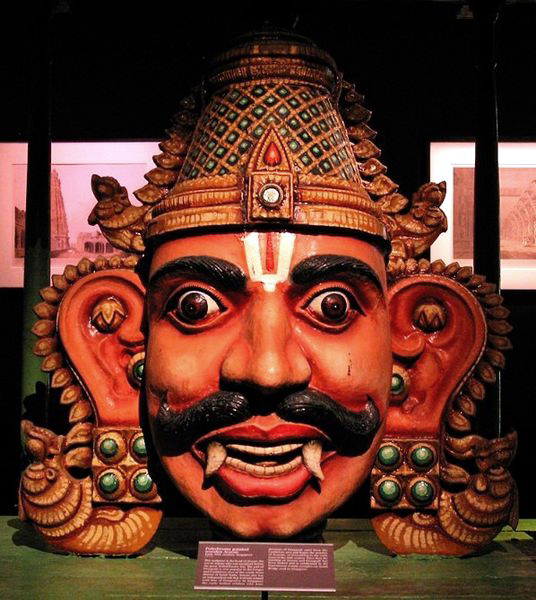
Iravan
Asian Civilizations Museum, Singapore
Iravan, the son of Arjuna Pandava, is one of the lesser known characters mentioned in the epic Mahabharata. Nonetheless, he is the object of worship by devotees across India. Also known as Iravat/Iravant, and Aravat, this grandson of Pandu is particularly worshiped in South India, by the Tamil cult of Kuttantavar and the Draupadi cult.
Iravan is the son of Arjuna and his consort Ulupi, the Naga princess. Iravan's parentage is mentioned in the Adi Parva of Mahabharata. As described in Srimad Bhagavatam 1.12.21, Arjuna married four wives: Draupadi, Subhadra, Citrangada and Ulupi. From them, he got four sons by the names Srutakirti, Abhimanyu, Babhruvahana and Iravan, respectively.
Arjuna met Ulupi at Haridvara (Hardwar), where he was attracted by the girl belonging to Nagaloka, and thus Iravan was born. In the same way he met Citrangada, a daughter of the King of Manipura, and thus Babhruvahana was born.
The birth of Iravan to Arjuna and Ulupi is almost mentioned in Srimad Bhagavatam 9.22:
"Dhrtarastra had one hundred sons, headed by Duryodhana, and one daughter named Duhsala. Pandu had five sons, headed by Yudhisthira, and each of these five sons had one son from Draupadi. The names of these sons of Draupadi were Prativindhya, Srutasena, Srutakirti, Satanika and Srutakarma. Besides these five sons, by other wives the Pandavas had many other sons, such as Devaka, Ghatotkaca, Sarvagata, Suhotra, Naramitra, Iravan, Babhruvahana and Abhimanyu. From Abhimanyu, Maharaja Pariksit was born, and Maharaja Pariksit had four sons--Janamejaya, Srutasena, Bhimasena and Ugrasena."
Srimad Bhagavatam 9.22 Summary
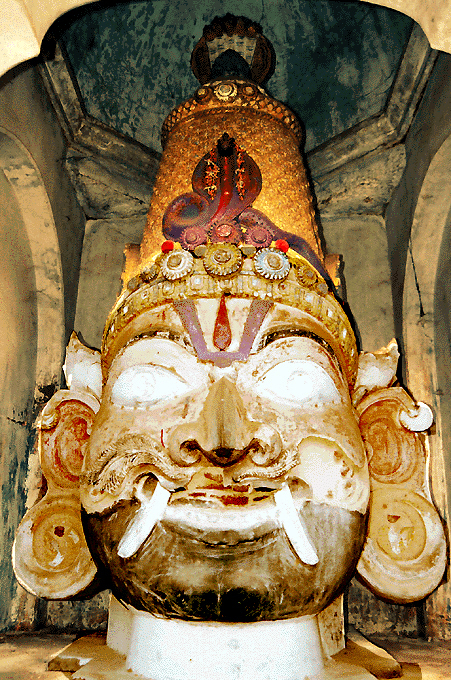
Iravan head, Draupadi-amman temple
The Bhagavatam describes how Lord Sri Krsna was directly involved in the marital affairs of Arjuna. He made a plan to help Arjuna kidnap His sister Subhadra, because Baladeva was inclined to hand her over to Duryodhana. Yudhisthira agreed with Krsna that this should not happen, therefore He arranged that Arjuna would take Subhadra by force, and marry her. Likewise, according to the devotees worshipping Aravan, Sri Krsna involved Himself in the marital affairs of Arjuna's son.
The South India cults that worship Iravan put great focus on a pastime in which he died a heroic death during the 18-day Battle of Kurukshetra. With great ceremony they honour Aravan's self-sacrifice to the goddess Kali, which he is said to have enacted in order to ensure her favour and thus bring victory for the Pandavas. According to Kuttantavar legend, Lord Krsna awarded three boons to Aravan for this self-sacrifice. One of these boons the Lord satisfied in His female form of Mohini, who became married to Aravan.
This pastime is re-enacted in Tamil Nadu with an 18-day festival. First there is a ceremonial marriage, then a celebration of their widowhood following the ritual re-enactment of Aravan's sacrifice.
Although the original Sanskrit version of the Mahabharata records Iravan's death as occurring during the 18-day Mahabharata war (Bhisma Parva), the Tamil versions says that Aravan's ritual self-sacrifice to Kali occurred before the war. The first account of his sacrifice is found in Parata Venpa—the earliest surviving Tamil version of the Mahabharata—by Peruntevanar (9th Century). But we do not know of this version, or Aravan's marriage to Mohini, having been verified by our Gaudiya Sampradaya Acaryas.
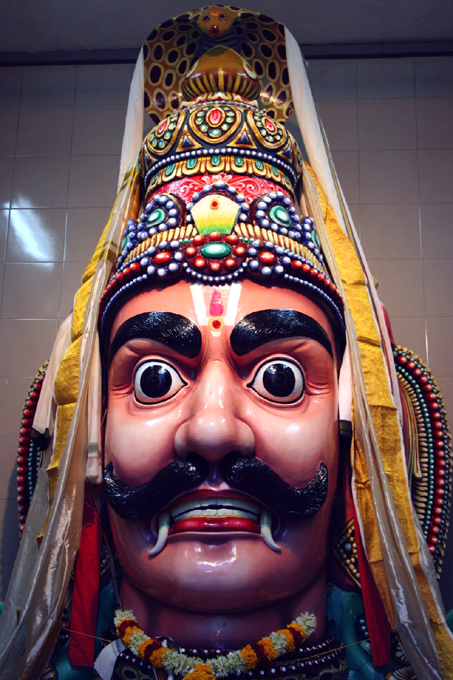
Iravan worshipped at Sri Mariamman Temple
The Draupadi cult emphasizes another boon associated with Aravan and the Kurukshetra war. In this pastime, Krsna allows Aravan to witness the entire duration of the Mahabharata war through the eyes of his severed head, which was hoisted on a pole overlooking the great valley battleground. The severed head of Aravan is a common motif in Draupadi temples. In the taluks of Thajavur, Kumbhakonam and Pattukkotai, Aravan's head is enshrined permanently in a mandapa or within a temple niche. The largest known Aravan head is found at the Hajiyar Teru temple in Kumbhakonam.
This pastime is reminiscent of another Mahabharata event, in which King Yalamber of Nepal arranged to have his severed head hoised on a pole overlooking the battlefield. At the start of the Kurukshetra war, King Yalamber was preparing to leave Nepal and go to Kurukshetra to witness the battle firsthand, with a view to taking the side of the losing party. Knowing the intentions and strength of Yalamber, Sri Krsna thought the war would be unnecessarily prolonged if Yalamber sided with the Kauravas. Krsna cleverly intercepted Yalamber along the way. He suggested that if the king would give him his head, He would situate the head in a high place, allowing the king to be witness to the war from a good vantage point overlooking the plains of Kurukshetra. The king would be spared the hardship of having to travel the great distance to Kurukshetra. In this way, Krsna kept the Nepali king from interfering in the war.
Aravan's head murti is usually depicted with a moustache, pronounced eyes and large ears. He is usually depicted wearing a conical crown, Vaishnava tilak and earrings. Sometimes Aravan is shown with a naga hood or hoods over or emerging from his crown. He typically also has the large curved teeth of a demon.
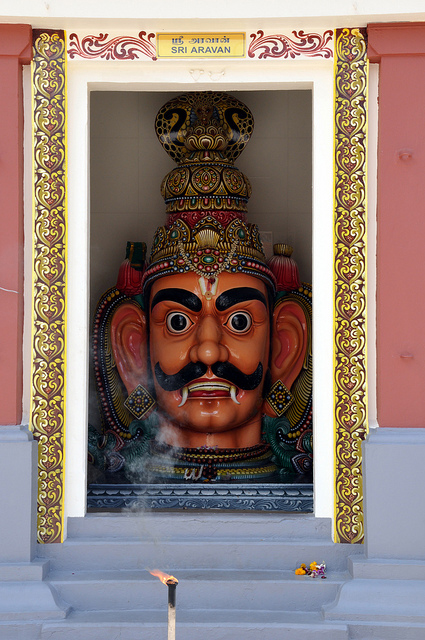
Aravan shrine, Sri Mariamman Temple
In Bhisma Parva, the sixth book of the epic Mahabharata, we find Arjuna exiled from Indraprastha and going on a one-year pilgrimage as penance for violating the terms of his marriage to Draupadi. When Arjuna reached the northeast regions he met and fell in love with Ulupi, a widowed Naga princess. The two married and she gave him a son who was named Iravan. Later on, however, Arjuna proceeded on with his pilgrimage, leaving Iravan and mother Ulupi behind in Nagaloka, the abode of the Nagas.
Iravan is described as being born parakshetre, or "in a region belonging to another person". In fact, he grew up in Nagaloka under the protection of his mother, but he was rejected by his maternal uncle because of the uncle's hatred for Arjuna. After reaching maturity, Iravan wished to reunite with his father, and he departed for Indraloka, the abode of the god Indra, who fathered Arjuna.
Iravan asked for Indra's help in fighting the Kurukshetra War. On the first day of the great battle Iravan fights a duel with Srutayush, a kshatriya king who had been a daitya named Krodhavasa in a previous life. Srutayush is later killed by Arjuna. On the seventh day of the battle, Iravan defeats Vinda and Anuvinda, the princes of Avanti, who are also killed later by Arjuna.
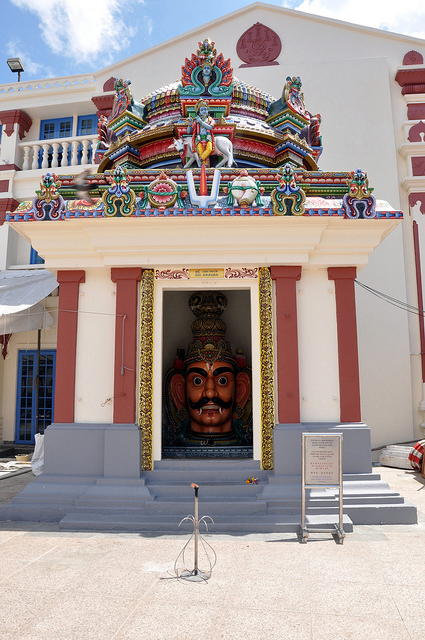
Aravan shrine
On the eighth day of the war, Iravan fought the princes of Gandhara, the sons of King Suvala, and the younger brothers of Shakuni, the treacherous maternal uncle of the Kauravas. The brothers Gaya, Gavaksha, Vrishava, Charmavat, Arjava, and Suka all attacked Iravan, supported by the whole Kaurava army, but Iravan's army of Nagas slayed all but one of their opponents. Iravan, the "chastiser of foes"—versed in maya (illusion)—slayed five Gandhara princes in a sword fight; Vrishava alone escaped death.
Agitated by this reversal, the eldest Kaurava, Duryodhana, ordered the rakshasa (giant) Alamvusha (or Alambusha), son of Rishyasringa, to kill Iravan. This time Alambusha, as well as Iravan, use illusion in combat. Alambusha attacks Iravan with a bow but Iravan counters, breaking Alambusha's bow and slicing the giant into several pieces.
Alambusha's body, however, reconstitutes itself. Then Iravan assumes the form of the serpent Shesha, and his serpent army surrounds him with protection. Alambusha counters this by assuming the form of Garuda, the eternal foe of the serpents, and devours the serpent army.
Ultimately, Alambusha kills Iravan by cutting off his head, although Iravan is later avenged when Ghatotkacha, his cousin, finally kills the demon Alambusha.
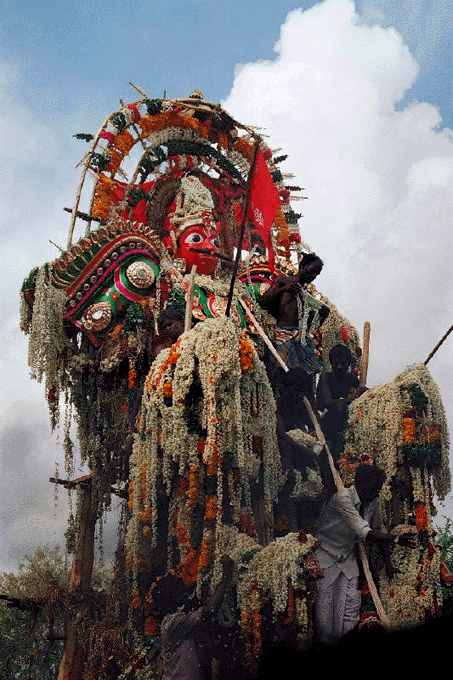
Aravan procession - Draupadi cult
Devotees of the Draupadi cult commemorate these pastimes from the Battle of Kurukshetra by conducting an annual festival known as Patukalam. The festival usually begins with a kuttu (drama) re-enacting Draupadi's wedding. During the festival, the actor playing the part of Draupadi, along with other women participating in the public ceremonies, lament the death of Aravan and the other heroes of the great war. Wherever the ritual kalappali is performed, that place is declared to be, symbolically, the battlefield of Kurukshetra






































